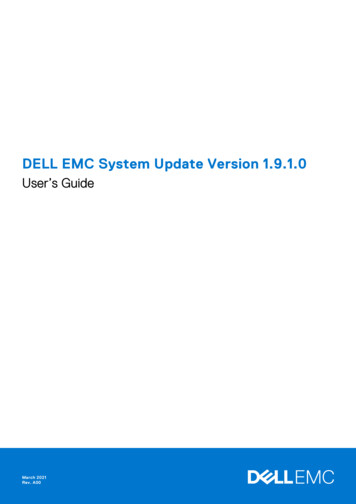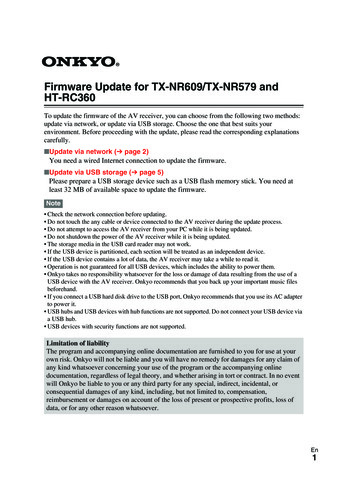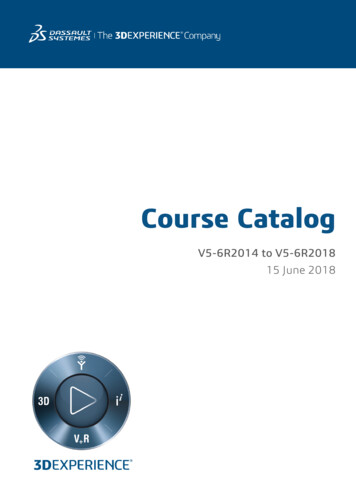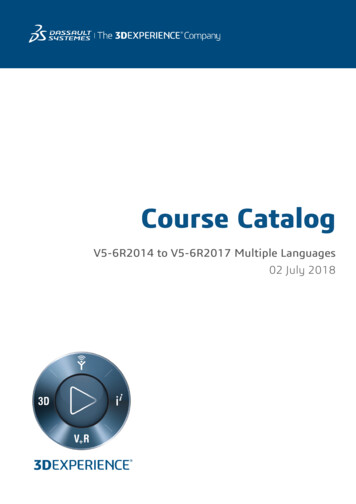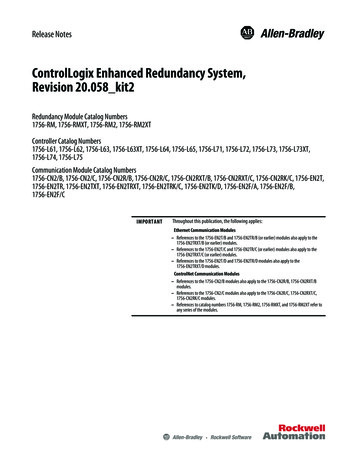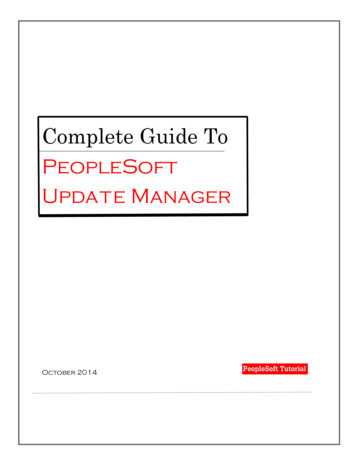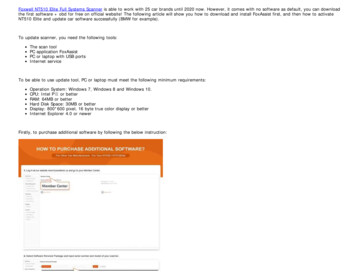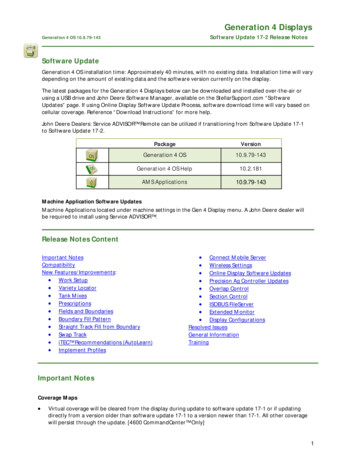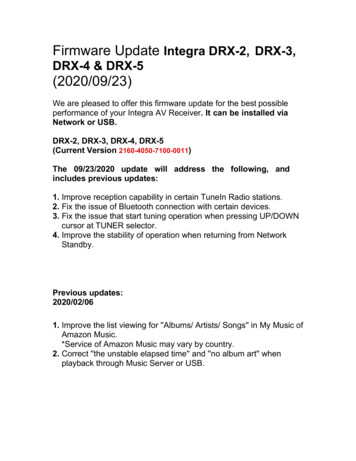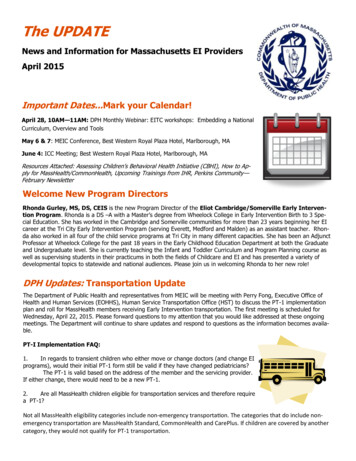
Transcription
The UPDATENews and Information for Massachusetts EI ProvidersApril 2015Important Dates.Mark your Calendar!April 28, 10AM—11AM: DPH Monthly Webinar: EITC workshops: Embedding a NationalCurriculum, Overview and ToolsMay 6 & 7: MEIC Conference, Best Western Royal Plaza Hotel, Marlborough, MAJune 4: ICC Meeting; Best Western Royal Plaza Hotel, Marlborough, MAResources Attached: Assessing Children’s Behavioral Health Initiative (CBHI), How to Apply for MassHealth/CommonHealth, Upcoming Trainings from IHR, Perkins Community—February NewsletterWelcome New Program DirectorsRhonda Gurley, MS, DS, CEIS is the new Program Director of the Eliot Cambridge/Somerville Early Intervention Program. Rhonda is a DS –A with a Master’s degree from Wheelock College in Early Intervention Birth to 3 Special Education. She has worked in the Cambridge and Somerville communities for more than 23 years beginning her EIcareer at the Tri City Early Intervention Program (serving Everett, Medford and Malden) as an assistant teacher. Rhonda also worked in all four of the child service programs at Tri City in many different capacities. She has been an AdjunctProfessor at Wheelock College for the past 18 years in the Early Childhood Education Department at both the Graduateand Undergraduate level. She is currently teaching the Infant and Toddler Curriculum and Program Planning course aswell as supervising students in their practicums in both the fields of Childcare and EI and has presented a variety ofdevelopmental topics to statewide and national audiences. Please join us in welcoming Rhonda to her new role!DPH Updates: Transportation UpdateThe Department of Public Health and representatives from MEIC will be meeting with Perry Fong, Executive Office ofHealth and Human Services (EOHHS), Human Service Transportation Office (HST) to discuss the PT-1 implementationplan and roll for MassHealth members receiving Early Intervention transportation. The first meeting is scheduled forWednesday, April 22, 2015. Please forward questions to my attention that you would like addressed at these ongoingmeetings. The Department will continue to share updates and respond to questions as the information becomes available.PT-I Implementation FAQ:1.In regards to transient children who either move or change doctors (and change EIprograms), would their initial PT-1 form still be valid if they have changed pediatricians?The PT-1 is valid based on the address of the member and the servicing provider.If either change, there would need to be a new PT-1.2.Are all MassHealth children eligible for transportation services and therefore requirea PT-1?Not all MassHealth eligibility categories include non-emergency transportation. The categories that do include nonemergency transportation are MassHealth Standard, CommonHealth and CarePlus. If children are covered by anothercategory, they would not qualify for PT-1 transportation.
BDI-2 Scoring BookletsThe Department is currently in the process of procuring funding for an order of BDI-2 scoring booklets. The order willbe placed in mid- to late-April and programs should expect to receive the scoring booklets by the beginning of May.ASQ:SE-2The Department is looking into purchasing ASQ:SE-2 Starter Kits for all early intervention programs. The kit includespaper masters of the questionnaires and scoring sheets, a CD-ROM with printable PDF questionnaires, the ASQ-SE2 User’s Guide and a free ASQ:SE Quick Start Guide (English or Spanish). The new edition will be available in the fall.NAS Working groupThe Department of Public Health, Early Intervention Training Center and members of the EI community will be meeting to discuss the system implications of the recent increase in NAS referrals. The first meeting will be held on Monday, April 27, 2015 from 10am – noon, at the Criterion Valley EIP, located at 375 Fortune Boulevard, Milford, MA.This first meeting will be an opportunity to further define the goals and objective of the Workgroup with regard to impact to the system.Making Respite Happen Conference: Thursday, May 14, 8AM—3PMFor information, click here.Policy to Practice: Child Groups—Immunization Requirements and RiskThere are several communicable diseases preventable by vaccination. Massachusetts allows for exemptions based onsincere religious beliefs or if the immunization is medically contraindicated (other states allow for an exemption based on“personal/philosophical belief” – this exemption is not recognized in Massachusetts).The EI Standards require programs to maintain the health and immunization records for each child enrolled in the EIprogram, not just enrolled in a child group. “All children enrolled in Early Intervention are up to date on immunizationsaccording to the recommendations of the Massachusetts Department of Public Health unless the child’s parent has stated in writing that vaccination or immunization conflicts with his/her sincere religious beliefs or if the child’s physician hasstated in writing that the vaccination or immunization is medically contraindicated” (EIOS Health and Safety: XI.C.1.e.).Please note, children who are considered homeless under the definition of McKinney-Vento may not be excluded or havetheir entry delayed from child group for lack of immunization documentation. Service coordinators will work with families to either facilitate attaining the necessary documentation or assist the family to find a health care provider.DPH recognizes that the EIOS do not currently address the immunization requirements for community children who participate in groups at the EI center (“primary site”) or in community settings (“non-primary site”). DPH strongly encourages programs to maintain consistent requirements of both EI eligible children and community children for immunizationrecords at the “primary sites”.2
Programs who participate/co-lead groups at “non-primary sites” may want to discuss with their community collaboratorswhat requirements related to immunization documentation exists.Given current immunization rates, the risk for exposure and contracting a vaccine preventable disease is low. The risk,however small, may still exist for some. The program, with input from their health care consultant, may wish to reviewthe program’s policies, procedures and materials shared with families related to vaccine preventable diseases as part ofthe program’s health care policies.Does the information shared with all parents identify or acknowledge;The importance of immunizations for vaccine preventable diseases The risk for contracting any vaccine preventable disease is low due to the high rate of vaccinated children andadults, but does exist in the general population and in all settings. The risk varies depending on a number of factors(for example, exposure, the age of the child and immunization status) Some participants in groups (children as well as adults) may not be fully immunized due to religious objection, medical contraindication, or because they have not been fully immunized themselves. The risk applies to the person whohas not been fully immunized. The program’s policies related to enrolling EI and/or community children who are not fully vaccinated. If the childgroup is at the EI program (“primary site”) the program may use discretion in developing policies for enrolling community children. The program’s policies related to excluding children/adults who appear to have a communicable disease.The Department of Public Health’s Immunization program offers several resources including: Information and fact sheets: /epidemiology/factsheets.html Schedule and requirements for school age and EEC licensed programs: /immunization/school-requirements.html Information for parents: entswww.immunize.org/catg.d/p4017.pdfCommunities of Practice “Pre-K Literacy and Oral Language SkillDevelopment: What Does High-Quality Pre-K Literacy InstructionLook Like?”Presentation by Nonie Lesaux, Ph.D., a Juliana W. and William Foss Thompson Professor of Education and Society atHarvard University.A distinguished researcher and clinician, Nonie leads a research program that focuses on promoting the language andliteracy skills of today's children and youth from diverse linguistic, cultural and economic backgrounds.This presentation will focus on the essential role that early educators play in facilitating young children’s early literacyand language development. Through discussion, case studies and classroom application activities, participants willhave an opportunity to learn about- What we know about early language and literacy development; The impact andalignment of language and early literacy and oral language skill development in early education settings; The intentional integration of practice and instruction; and Why early literacy is such a critical developmental stage for the childand how it can lead to later child success in school and expanded life opportunities;The link for registration is: does-high-quality-tickets-16316844120 SOLD OUT—SIGN UP FOR WAIT LIST.Thursday, May 7, 2015 RSVP BY: 4/30/20159:30-12:30 Kuss Middle School Community Room,52 Globe Mills Ave, Fall River, MA 02360Tuesday, May 5, 2015 RSVP BY: 4/28/20159:30-12:30 Merrimack College315 Turnpike St North Andover, MA 01845Meeting Room B in Sakowich Campus Center3
Thursday, May 14, 2015 RSVP BY: 5/7/20159:30-12:30 Milton Cunningham Hall75 Edge Hill Road, Milton, MA 02186(Across from Cunningham/Collicot School)Friday, May 8, 2015 RSVP BY: 5/1/20159:30-12:30 Worcester Public Library,Saxe Room – 3 Salem St. Worcester, MA 01608Thursday, May 15, 2015RSVP BY: 5/08/2015, 9:30-12:30 EEC-Western,1441 Main Street, 2nd Floor, Springfield, MA 01103Early Intervention, Regional Consultation Programs, and MA DPH CareCoordination: A Critical and Flourishing CollaborationBy Dalila Hyry-Dermith, Care Coordination Program Statewide SupervisorChildren with complex medical and coordination needs desire support with many transitions intheir lives, and it is the responsibility of the organizations that support and care for these children and their families to make sure that key transitions are smooth and effective. One model for collaborative efforts to do exactly that—to support children and families through a keyearly transition—has been in place for several years in Massachusetts, and it is making a bigdifference for some pretty important small children.Leaders from the Massachusetts Department of Public Health’s Care Coordination Program for Families of Children andYouth with Special Needs (DPH Care Coordination) and the Regional Consultation Programs (RCPs) located with EarlyIntervention programs in each region met to work on a collaborative solution. They developed a system for supportingthe transition out of EI (when a child is approaching her/his third birthday) into the public school sphere whereby theRCP passes the wraparound supports “torch” to DPH Care Coordination in order to assure ongoing support for familiesand children. Components of this collaboration include: Monthly conference calls among RCP and DPH Care Coordination staff to identify each child involved with RCP whois making the transition from EI to public school, learn about the child’s specific needs, and (when appropriate) assign a DPH Care Coordinator to work with the family.Joint home visits between EI professionals, RCP, and DPH Care Coordinators to officially transition the family fromEI to DPH supportOngoing shared professional development/in-services to share and discuss best practicesRegular participation by Care Coordination and RCP staff at each other’s Program meetings to keep lines of communication openRCP, DPH Care Coordination, and EI staff are all justifiably proud of this collaboration—it fulfills the spirit in which ourprograms were created, and most of all, we know it is good for children. For more information about these programs,please visit: DPH Care Coordination program: mily-health/carecoordination.html RCP Description and locations belowListing of RCPs in each region: www.eiplp.org/documents/RCP11.12.pdfSpecialty Services Update: 2015 Early Connections Conference (click photo)2015 Early Connections Conference: Celebrating your child’s gold medal momentsRegister Now4
Perkins Community Programs’ February NewsletterThe Perkins Community Programs February Newsletter highlights the work of the Infant Toddler Program. Perkins hascreated a team of teachers to specifically work with EI aged children, which has given staff an opportunity to focus onearly childhood and family issues. This newsletter should be of interest to parents considering an affiliation with Perkins aswell as to staff. Please see the newsletter at the end of this publication.Data Manager Update: New Federally Required ReportThe Child Count report provides OSEP with the number of IFSP children active on a specified day of the year for allstates. As part of this report states have been given the option to also report the number of IFSP children served duringa 12-month period of time. This option will now become a requirement for all states. But, in addition, a race/ethnicitybreakdown of these children will also be required. One of the monthly error reports sent to programs (Error Report #2:“Missing EIIS Client forms and/or eligibility data – IFSP children”) includes an error code for children whose race/ethnicity is missing. As the end of the fiscal year gets closer it will become important to make sure that all IFSP childrenhave this information completed in EIIS. Please remember the guidelines for completing this information from familieswho intentionally refuse to answer the
ASQ:SE-2 The Department is looking into purchasing ASQ:SE-2 Starter Kits for all early intervention programs. The kit includes paper masters of the questionnaires and scoring sheets, a CD-ROM with printable PDF questionnaires, the ASQ-SE2 Us-er’s Guide and a free ASQ:SE Quick Start Guide (English or Spanish). The new edition will be available in the fall. NAS Working group The Department of .
